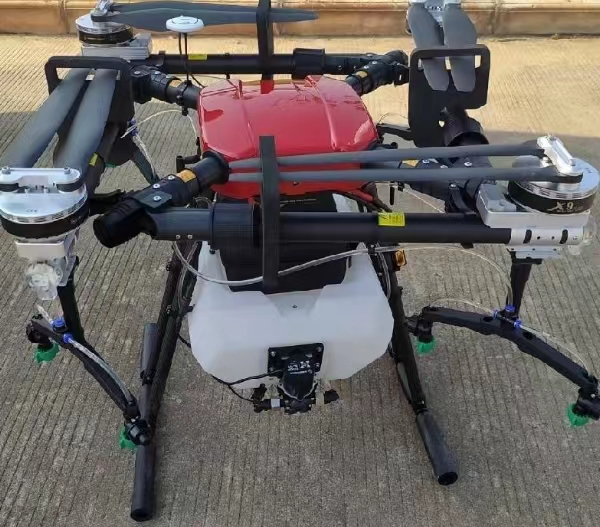![图片[1]-Affordable agricultural drone for small farms-msoen](https://www.msoen.com/wp-content/uploads/2025/02/545c3a7d066d-576x1024.jpg)
Drone Spraying Equipment Suppliers: Pioneering Precision in Modern Agriculture
The integration of drone technology into agriculture has unlocked unprecedented efficiency, sustainability, and scalability for farmers worldwide. Central to this transformation are drone spraying equipment suppliers, who provide cutting-edge systems designed to optimize crop management, reduce environmental impact, and enhance yields. As the demand for precision agriculture grows, these suppliers are driving innovation, offering solutions that redefine traditional farming practices.
The Role of Drone Spraying Equipment in Agriculture
Drone sprayers have emerged as vital tools for modern farmers, addressing challenges such as labor shortages, uneven chemical application, and environmental concerns. Equipped with advanced technologies, these systems enable:
Precision Agriculture: Targeted delivery of pesticides, herbicides, and fertilizers to specific areas, minimizing waste and maximizing effectiveness.
Efficiency: Coverage of large or difficult-to-access fields in a fraction of the time required by ground-based machinery.
Sustainability: Reduced chemical runoff and lower carbon emissions compared to conventional spraying methods.
Data-Driven Insights: Integration with mapping software and sensors to monitor crop health and adjust treatments in real time.
Suppliers of drone spraying equipment play a critical role in ensuring these benefits reach farmers by developing reliable, user-friendly, and adaptable systems tailored to diverse agricultural needs.
Key Features of Leading Drone Spraying Systems
When evaluating drone spraying equipment suppliers, farmers and agribusinesses prioritize several core features:
Payload Capacity and Battery Life: High-capacity tanks and extended flight times enable efficient coverage of expansive fields. Modern systems often support swappable batteries and rapid refilling to minimize downtime.
Spraying Accuracy: Advanced nozzle designs, variable-rate technology, and AI-powered systems ensure uniform chemical distribution, even in challenging terrain.
Durability and Adaptability: Equipment built to withstand harsh weather, dust, and chemical exposure is essential for long-term reliability. Modular designs allow customization for crops ranging from rice paddies to vineyards.
Smart Farming Integration: Compatibility with farm management software, GPS mapping, and IoT platforms enables seamless data sharing and decision-making.
Regulatory Compliance: Suppliers must adhere to regional aviation and agricultural regulations, ensuring safety and legal operation.
Applications Across Agricultural Sectors
Drone spraying systems are versatile tools applicable to a wide range of farming scenarios:
Large-Scale Row Crops: Efficiently manage corn, soy, or wheat fields with autonomous flight paths and high-volume spraying.
Orchards and Vineyards: Navigate dense foliage and steep slopes to protect high-value fruit crops.
Organic Farming: Enable precise application of organic treatments, reducing contamination risks.
Disaster Response: Rapidly deploy drones to combat pest outbreaks or disease spread before they escalate.
Suppliers are increasingly tailoring solutions to niche markets, such as greenhouse operations or agroforestry, demonstrating the flexibility of drone technology.
Challenges Faced by the Industry
While drone spraying equipment offers immense potential, suppliers must address several barriers to widespread adoption:
High Initial Costs: Advanced drones and sensors require significant investment, which may deter small-scale farmers.
Technical Complexity: Operators need training to master flight controls, maintenance, and data analysis tools.
Regulatory Hurdles: Evolving aviation laws and chemical-use restrictions vary by region, complicating market entry.
Public Perception: Concerns about noise, privacy, and job displacement require proactive communication from suppliers.
To overcome these challenges, leading suppliers focus on education, financing options, and collaboration with governments to streamline regulations.
Future Trends in Drone Spraying Technology
The next generation of drone spraying systems is poised to revolutionize agriculture further:
AI and Machine Learning: Algorithms that analyze crop data in real time to adjust spray patterns and dosage autonomously.
Swarm Technology: Fleets of drones working collaboratively to cover vast areas faster, guided by centralized control systems.
Green Energy Solutions: Solar-powered charging stations and hydrogen fuel cells to enhance sustainability.
Multi-Functional Drones: Modular platforms capable of switching between spraying, seeding, and crop monitoring tasks.
Blockchain Integration: Transparent tracking of chemical usage for compliance and sustainability reporting.
Suppliers investing in these innovations will likely lead the market, offering farmers smarter, more integrated solutions.
Choosing the Right Drone Spraying Equipment Supplier
For farmers seeking reliable partners, key considerations include:
Proven Track Record: Look for suppliers with demonstrated expertise in agricultural applications and robust customer support.
Localized Support: Availability of spare parts, repair services, and training programs tailored to regional needs.
Scalability: Systems that grow with your operation, from smallholder plots to industrial farms.
Sustainability Commitments: Suppliers prioritizing eco-friendly designs and reduced chemical dependency.
Conclusion
Drone spraying equipment suppliers are catalysts for a new era of smart, sustainable agriculture. By delivering precision, efficiency, and scalability, their technologies empower farmers to meet the dual challenges of rising global food demand and environmental stewardship. As advancements in automation, AI, and green energy accelerate, these suppliers will continue to shape the future of farming—ensuring that agriculture remains productive, profitable, and planet-friendly for generations to come.
For stakeholders in the agricultural sector, partnering with innovative drone spraying equipment suppliers is no longer optional but a strategic imperative to thrive in an increasingly competitive and resource-constrained world.






暂无评论内容